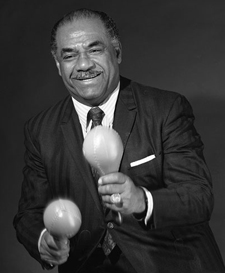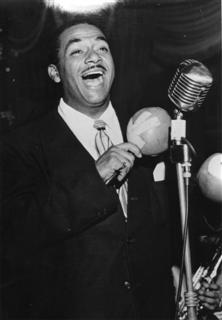Machito was born February 16, 1912 in Tampa, Florida and died April 15, 1984 in London, England. He was the King of Afro-Cuban jazz. He grew up singing and playing with many of the leading musicians of Cuba. After playing with a few groups in Havana, he moved to New York City in 1937, following the lead of his friend (and later, brother-in-law), Mario Bauza.
many of the leading musicians of Cuba. After playing with a few groups in Havana, he moved to New York City in 1937, following the lead of his friend (and later, brother-in-law), Mario Bauza.
In 1940, they decided to form a group and try out a style that combined Cuban rhythms and melodies and orchestrations derived from swing. Billed as the Afro-Cubans, the group was soon signed to Decca Records and had a few minor hits with numbers like “Sopa de Pichon [Pigeon Soup]” and Bauza’s composition, “Tanga” (which later became Machito’s theme song).
Machito’s sister, Graciela, came to the U.S. to sing with and lead the band with Bauza after Machito was drafted into the Army in 1942. Discharged due to an injury in 1943, he resumed performing and became a regular act featured in weekly radio broadcasts from the La Conga Club. Machito’s Latin rhythms began to influence many of New York’s jazz musicians, most notably Dizzy Gillespie, who had worked with Bauza in Cab Calloway’s band and was now pioneering a new style that would eventually be called, “bebop.”
 Another jazz artist influenced by Machito was Stan Kenton, whose new band was beginning to enjoy huge popularity. Kenton called Machito the “greatest exponent of Afro-Cuban jazz” and even recorded a Latin-flavored number titled, “Machito.” He and Machito shared the bill in a historic concert at Manhattan’s Town Hall on January 24, 1947.
Another jazz artist influenced by Machito was Stan Kenton, whose new band was beginning to enjoy huge popularity. Kenton called Machito the “greatest exponent of Afro-Cuban jazz” and even recorded a Latin-flavored number titled, “Machito.” He and Machito shared the bill in a historic concert at Manhattan’s Town Hall on January 24, 1947.
Producer Norman Granz then got the idea of pairing the great bebop alto saxophonist Charlie Parker and tenor Flip Phillips with Machito in for a series of recordings in December 1948 that have since been cited for establishing “the Latin-jazz connection for all time.” With compositions and arrangements by Bauza and Chico O’Farrill, Machito’s recordings from this period (reissued on Mucho Macho) are considered his band’s finest work.
Machito continued to perform both in the U.S. and abroad until his death. One of his last recordings, “Machito and His Salsa Big Band,” won the Grammy for best Latin album in 1982 and Machito was waiting to go on stage at Ronny Scott’s nightclub in London when he suffered a fatal heart attack in 1984.



 many of the leading musicians of Cuba. After playing with a few groups in Havana, he moved to New York City in 1937, following the lead of his friend (and later, brother-in-law), Mario Bauza.
many of the leading musicians of Cuba. After playing with a few groups in Havana, he moved to New York City in 1937, following the lead of his friend (and later, brother-in-law), Mario Bauza. Another jazz artist influenced by Machito was Stan Kenton, whose new band was beginning to enjoy huge popularity. Kenton called Machito the “greatest exponent of Afro-Cuban jazz” and even recorded a Latin-flavored number titled, “Machito.” He and Machito shared the bill in a historic concert at Manhattan’s Town Hall on January 24, 1947.
Another jazz artist influenced by Machito was Stan Kenton, whose new band was beginning to enjoy huge popularity. Kenton called Machito the “greatest exponent of Afro-Cuban jazz” and even recorded a Latin-flavored number titled, “Machito.” He and Machito shared the bill in a historic concert at Manhattan’s Town Hall on January 24, 1947.